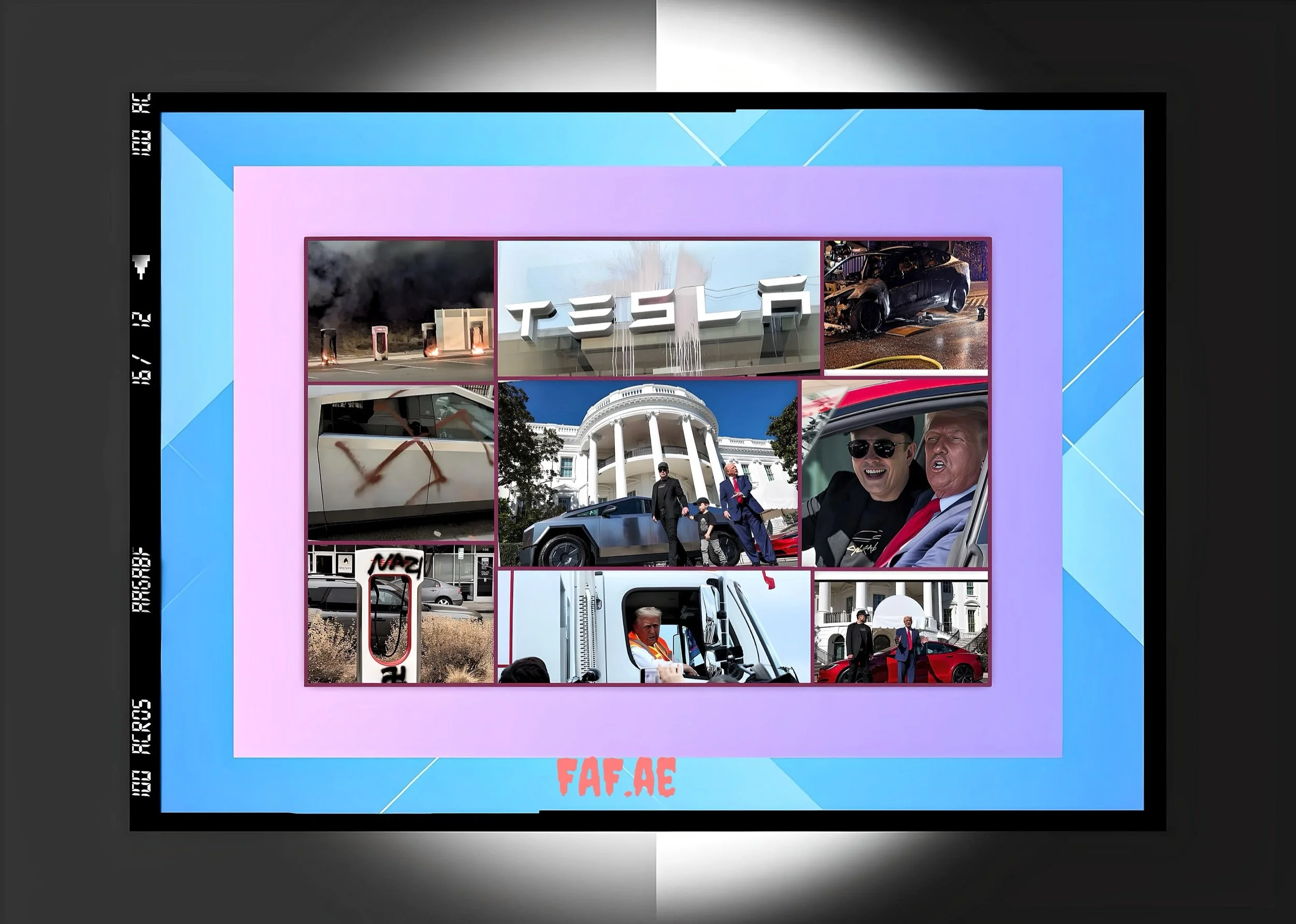Elon Musk’s Mounting Challenges: Political Controversies, Market Decline, and Corporate Survival Strategies
Introduction
The Next Enron?
Elon Musk once celebrated as a visionary entrepreneur, now faces an unprecedented convergence of political, legal, and economic challenges across Europe and the United States.
Tesla’s stock has plummeted by over 50% since December 2024, driven by weakening sales, regulatory scrutiny, and backlash against Musk’s polarizing political engagements.
Simultaneously, German authorities are investigating Musk’s alleged interference in national elections, raising the specter of asset seizures against Tesla’s operations in Europe.
In the U.S., protests and vandalism targeting Tesla dealerships have intensified while President Donald Trump attempts to bolster Musk’s standing through public endorsements.
This article synthesizes these developments and analyzes their implications for Tesla’s future and Musk’s legacy.
German Election Interference Allegations and Tesla’s European Crisis
Musk’s Endorsement of Far-Right AfD and Political Fallout
In January 2025, Elon Musk sparked outrage in Germany by publicly endorsing the far-right Alternative for Germany (AfD) party ahead of snap elections.
During a live stream with AfD co-leader Alice Weidel, Musk declared, “Only AfD can save Germany, end of the story,” while criticizing Chancellor Olaf Scholz as an “incompetent fool.”
This intervention triggered accusations of foreign election meddling, with German officials likening Musk’s actions to Russian disinformation campaigns.
The backlash has had tangible consequences
Sales Collapse
Tesla’s European deliveries fell 45% year-over-year in January 2025, with German sales plummeting 59.5% to just 1,277 vehicles. Analysts attribute this to consumer rejection of Musk’s alignment with AfD, a party monitored by German intelligence for extremism.
Legal Threats
Friedrich Merz, leader of Germany’s Christian Democratic Union (CDU), warned of potential “political or legal consequences,” including investigations into whether Musk’s AfD support constitutes illegal campaign donations.
Broader EU Repercussions and Asset Seizure Risks
Musk’s political maneuvers have jeopardized Tesla’s €5.8 billion Gigafactory near Berlin, which produces 500,000 vehicles annually.
German lawmakers are debating measures ranging from subsidy clawbacks to nationalization, citing Musk’s “anti-democratic” conduct.
Meanwhile, France and the Netherlands have initiated antitrust probes into Tesla’s market dominance, with EU regulators considering bloc-wide sanctions.
Escalating Backlash in the United States: Protests, Vandalism, and Stock Collapse
The “Tesla Takedown” Movement and Infrastructure Attacks
Since Musk assumed leadership of Trump’s Department of Government Efficiency (DOGE) in January 2025, over 120 Tesla-related sites have been targeted:
Arson and Vandalism
Seven Supercharger stations near Boston were firebombed on March 3, while a Colorado woman, Lucy Grace Nelson, faces federal charges for attacking a dealership with Molotov cocktails.
Organized Protests
The “Tesla Takedown” movement has mobilized thousands, with activists occupying showrooms in New York and defacing vehicles with slogans like “Nazi Elon.”
These attacks coincide with Tesla’s first annual sales decline (-7% YoY in 2024), as competitors like BYD and Rivian capitalize on the brand’s political toxicity.
Stock Market Meltdown and Investor Exodus
Tesla’s NASDAQ valuation has imploded from $1.5 trillion in December 2024 to $712 billion as of March 11, 2025. Key drivers include:
Delivery Shortfalls
Q1 2025 deliveries are projected at 367,000 units (-26% QoQ), with China sales crashing 49% in February.
Analyst Downgrades
UBS slashed its price target to $225, warning of “structural demand erosion” exacerbated by Musk’s political activities.
Institutional Sell-Off
BlackRock and Vanguard sold 28 million shares (—$6.2 billion) in February, citing governance risks.
Technical analysts identify $200 as critical support; a breach could trigger another 30% decline to $140.
Trump’s Intervention: Political Theater vs. Economic Realities
Symbolic Gestures and Policy Shifts
Seeking to stabilize Tesla, Donald Trump has escalated support through:
Personal Endorsements
On March 11, Trump purchased a red Model X at the White House, declaring Tesla attacks “domestic terrorism” punishable by “going through hell.”
Regulatory Favors
The DOGE exempted Tesla from new steel/aluminum tariffs, saving the company $420 million annually.
Limited Efficacy of Political Patronage
Despite Trump’s efforts, market realities persist:
Consumer Backlash
23% of U.S. Tesla owners report harassment, with used vehicle prices falling 18% as buyers avoid the brand.
Investor Skepticism
ARK Invest’s Cathie Wood acknowledges “governance risks overshadowing technological upside,” reducing Tesla’s target portfolio allocation from 10% to 6%.
Future Trajectories: Survival Strategies and Existential Threats
Legal and Operational Risks in Europe
German Election Aftermath
If AfD underperforms in the February 23 elections (current polls: 22% vs. CDU’s 34%), Merz’s government could impose punitive measures like:
Revoking $2.1 billion in EV subsidies
Blocking Gigafactory expansion permits
EU-Wide Retaliation
France’s Macron advocates for “reciprocal measures” against U.S. tech firms, potentially subjecting Tesla to 30% tariffs.
U.S. Market Reckoning
Tesla faces a lose-lose scenario
Continued Trump Alliance
Risks alienating 68% of Tesla’s core demographic (ages 25-44, college-educated).
Distancing from Trump
Could trigger subsidy losses and DOGE contract cancellations.
Innovation vs. Distraction Paradox
While Musk touts AI breakthroughs like the Gen-3 Optimus robot, R&D spending has dropped to 3.2% of revenue (vs. 12.4% in 2022), with top engineers defecting to Apple and Google.
Conclusion
A Precarious Crossroads
Elon Musk’s empire faces existential threats on multiple fronts. In Europe, legal actions could dismantle Tesla’s manufacturing base, while U.S. consumer rejection threatens its demand foundation.
Trump’s patronage provides temporary respite but deepens long-term brand erosion.
For Tesla to survive, Musk must either depoliticize his leadership—a move contradicting his recent trajectory—or execute technological miracles that transcend geopolitical tensions.
With institutional investors fleeing and legacy automakers seizing market share, the next six months will determine whether Tesla stabilizes as a diminished player or collapses under the weight of its founder’s ambitions.
The road ahead necessitates flawless execution: Tesla is poised to revitalize European sales with strong localized leadership, drive FSD adoption well beyond the 42% mark, and effectively manage legal liabilities.
Disappointment on any front could render Tesla the next Enron—a cautionary tale of genius derailed by hubris.






